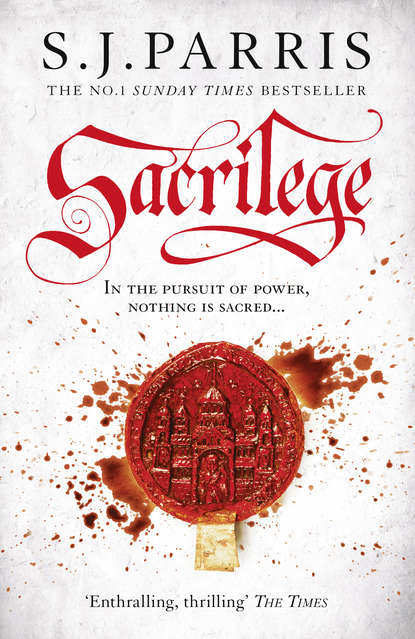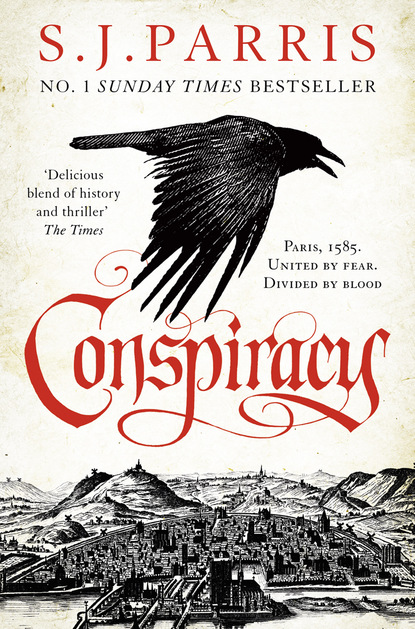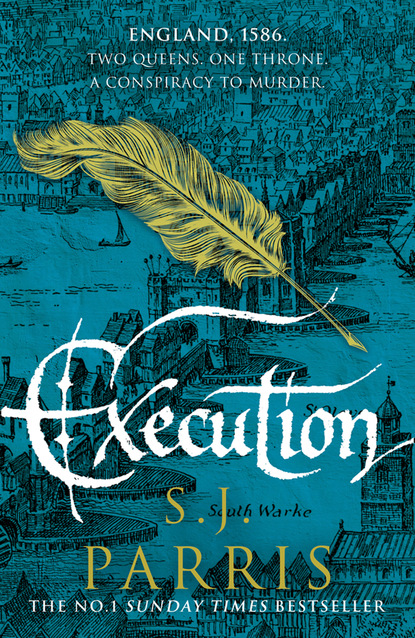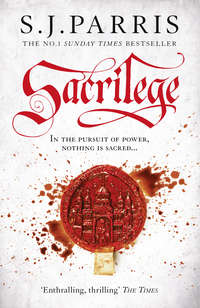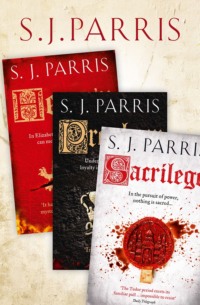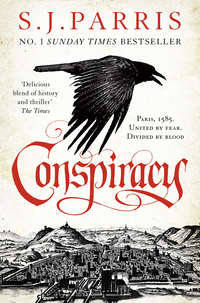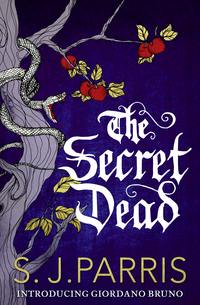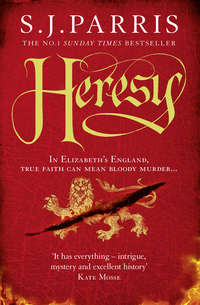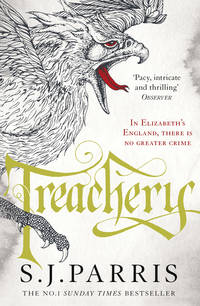
Полная версия
‘That’s very good of you, Sir William. Although you will be at sea for the next twelve months, at least. I fear the options will be limited.’
‘True, true,’ he says, rolling the tip of his moustache between his fingers. ‘Well – when I come back. A governess or some such might do you nicely.’
‘I humbly thank you.’
At the door, Sidney catches my eye and nods towards the stairs.
‘Where are you two going with such eager expressions, eh?’ Savile asks. ‘Don’t fancy some cards, I suppose? I’m bored witless on that ship.’
‘Have you been starting brawls for entertainment?’ Sidney asks, indicating his lip.
‘What, this?’ Savile reaches up and gingerly touches the cut. ‘It was nothing. A misunderstanding. Idleness frays tempers.’ He lowers his voice. ‘The men just want to set sail, you know. I understand Sir Francis wants to pay his respects to Dunne’s family, but really, there’s the rest of the fleet to think of, not to mention the investors. The longer we delay, the greater the chance one of Philip of Spain’s spies will catch wind of what we’re up to and slip him a warning. We won’t get as far as the Azores before some Spanish fleet jumps out on us.’
‘What spies?’ I ask.
‘They’re everywhere,’ he says, with a theatrical gesture that takes in the inn’s wide entrance hall. I look around. The place is empty, save for us. ‘Well, they’re bound to be – port full of foreigners, easy for them to slip into the crowd. Drake even keeps a damned Spaniard on his own ship – have you ever heard anything so absurd? I’ll wager he’s tipping off his countrymen somehow – terrible shifty look about him, y’know? Well, they all do, the Catholics – it’s those black eyes they have. Can’t tell if they’re looking at you straight.’
I regard him impassively with my black eyes until he gives a little cough. ‘Saving your presence.’
‘I’m afraid we must pass up the card table for now, Sir William,’ Sidney says, to cover the awkward pause. ‘We are going up to read some poetry.’
‘Oh, good Lord,’ Savile says. ‘Poetry. I’d rather put my balls in a wine press. God save you, gentlemen.’ With a brisk bow, he strides away to the tap-room.
‘Perhaps your man in black is one of these Spanish spies that have infested the place,’ Sidney muses, as we climb the stairs. I send him a withering glance. ‘Stop looking at me with your shifty Catholic eyes,’ he says, and skips out of the way before I can land a punch in his ribs.
FIVE
The room is larger and better furnished than the one I am sharing with Sidney; I see his gaze wandering around it with a touch of envy. There is no sign of the women. Drake sits on the end of an ornately carved bed. On his lap he holds a leather bag, his hands spread protectively over it, as if someone might try to snatch it from him. He looks up with a distracted smile and waves us to a chair with tapestried cushions by the fireplace. There is only one; Sidney sits, I lean against the mantelpiece. Thomas Drake stands with his back to the door and nods to his brother.
‘Gentlemen,’ Drake says. ‘There is something I wish to show you, but it must be done in confidence.’
‘Does it touch on the death of Robert Dunne?’ Sidney asks, sitting forward to the edge of his chair. Drake hesitates.
‘I believe so. I am hoping you might clarify that.’
From his place by the door, Thomas Drake makes a barely audible sound of disapproval. Drake looks up. ‘My brother feels strongly that what I am about to share with you should remain a secret. But I have explained to him that you gentlemen are scholars, as we are not. And I believe we may trust you. After all, you want something from me, do you not?’ He fixes Sidney with a knowing eye. ‘A passage to the New World?’
Sidney nods, silent.
‘Well, then.’ Drake smiles. He pulls at his beard, considering. ‘The question is where to begin.’
‘The letter,’ Thomas prompts. He does not sound enthusiastic.
‘Yes.’ Drake purses his lips, then takes a deep breath, as if he is about to embark on a difficult venture. ‘The same day we discovered poor Dunne’s body – that very evening, in fact – I received a message. It was brought to me on board the Elizabeth by my clerk, Gilbert, who collects letters that arrive for me every day from this inn. Here.’ He reaches inside his doublet and draws out a sheet of paper, which he holds out. I step forward and take it from his hand, as I am nearer. The paper is rough along one edge as if it has been torn from a notebook, folded in three and had been sealed with crimson wax, though there is no mark impressed in the seal. I unfold the paper and lower it so that Sidney can see it too. The message says simply,
Matthew 27 v 5
‘Cryptic,’ Sidney mutters, taking the paper from my hand and turning it over. ‘What is the verse? Bruno?’
‘I’ll wager he knows,’ Drake says, catching my expression and pointing at me.
‘“And he cast down the pieces of silver in the temple, and departed, and went and hanged himself,”’ I murmur. ‘The death of Judas Iscariot.’
Drake looks impressed. ‘Do you carry the whole of the scriptures in your head?’
‘Oh, Bruno is a master of the art of memory,’ Sidney says, with what might be a hint of pride. ‘He has devised his own system. It is what passes for entertainment where he is from. He can do you the whole of Homer if you find yourself bored one evening.’
‘That will make the voyage fly,’ Thomas Drake says, arching an eyebrow.
I return his sarcastic smile, and tap the paper in Sidney’s hand. ‘This verse. You think it is some reference to Dunne, I suppose?’
‘The day he dies, apparently by hanging himself? I see no other way to read it,’ Drake says.
‘According to the Gospel of Matthew, Judas Iscariot hanged himself from remorse after he betrayed his master,’ I say, running through the text in my mind. ‘Is this mystery correspondent trying to imply that Dunne did the same? That he hanged himself out of guilt? Had Dunne betrayed anyone, that you know of?’
‘But we don’t believe Dunne did hang himself,’ Sidney points out.
We look at Drake. He sighs heavily and opens the bag on his lap.
‘Betrayal. Perhaps. Or it may refer to something else.’ He reaches in and withdraws a bound manuscript. I straighten immediately, feeling goosebumps rise on my skin. In my thirteen years at the monastery of San Domenico Maggiore I spent much of my time in the scriptorium and among the archives of their library, and later among the booksellers of Venice; I can recognise manuscripts almost by touch and smell, and tell you their provenance by the feel of their bindings, their vellum, their ornamentation. I do not need to touch the one Drake now holds carefully between his fingertips to know that it is both old and unusual. Instinctively, I step forward and reach out for it.
He raises a hand. ‘Bear with me, gentlemen, while I tell you a story that will help to explain what I am about to show you.’
Sidney clasps his hands around his knees like an eager child at his grandfather’s chair. I shift my position against the mantel and give Drake my full attention.
‘It begins eight years ago, at the beginning of my voyage to circumnavigate the globe,’ Drake says. ‘Does the name Thomas Doughty mean anything to you?’
He directs this question to Sidney, who sits up, surprised.
‘Doughty? But of course – he used to work for my uncle Leicester. Before he was—’ he checks himself, looking at Drake, uncertain. ‘Before he died.’
‘He was executed,’ Drake says, brusquely. ‘In a godforsaken place called Port San Julian, in Patagonia, at the end of the world. He was beheaded on my order in plain sight of all my crew, and with good justification, whatever gossip you may have heard at court.’ He juts his chin out, as if challenging us to argue. Sidney shrinks back slightly into his chair.
‘But that is not the beginning of the story,’ Drake continues, his voice softer. ‘Early in our voyage, not far from the Cape Verde islands, we captured a small ship, the Santa Maria. She was on her way to the Americas, so there was nothing of great value in the hold, but she was worth the trouble for the provisions she carried and for the use of an extra vessel. I packed her crew into the longboats and set them adrift to shore – despite the reputation Spain wants to give me, I prefer to get where I’m going without bloodshed, if I can. But there was an unfortunate incident during the capture.’ He pauses and rubs the back of his neck, as if it discomforts him to recall. ‘On board the Santa Maria was a young priest travelling out to the colonies, a Jesuit. He barricaded himself into one of the private cabins when we boarded, even though the captain had surrendered almost immediately. Thomas Doughty and his brother John broke the door down. The young priest was backed into a corner, they said, holding a dagger in one hand, and with the other clasping to his chest a wooden casket. Naturally they assumed its contents must be of value – they asked him repeatedly to give it up to them, but the priest refused. When Doughty took a step towards him, the priest ran at the brothers with his weapon, calling down all manner of curses upon them. It was an act of reckless desperation – both the Doughtys were armed with swords and when the priest lunged with his little dagger, Thomas Doughty ran him through. When the Jesuit realised he was fatally wounded, he tried to throw the casket out of the window, but John Doughty managed to stop him. You may imagine their disappointment when they discovered that the casket contained only this old manuscript, in a language neither of them could read.’
He pauses, and motions to his brother to bring him a glass of wine. Thomas Drake pours from a jug on a small table by the door and offers it to us; Sidney accepts, though I shake my head, wanting Drake to continue his story. Already my mind is racing ahead, my eyes still fixed on the manuscript under Drake’s hands; if a priest was willing to sacrifice himself to save those pages, or even throw them into the sea to keep them from being found, they must possess their own kind of value. One perhaps only another scholar can assess.
‘Since none of us could read it, the manuscript was consigned to the hold of the Santa Maria,’ Drake says, after a long drink, ‘and placed in a locked chest to be inventoried with the rest of the spoils. The incident with the priest was regrettable, and did not sit well with the crew, for all their dislike of the Spanish. Thomas Doughty was not popular among the men – he was high-handed and did not believe a gentleman should shoulder his share of the manual work. We had barely left Plymouth before word had reached me that Doughty was criticising my command in front of the men, and I was obliged to reprimand him, which created open resentment between us. The crew began to mutter that the murder of a priest would bring curses on our voyage – some said the priest had invoked the Devil with his dying breath.
‘The Santa Maria was rechristened the Mary, in honour of my first wife, and I gave Thomas Doughty command of her, thinking this responsibility might persuade the men of my confidence in him, and quiet his rebellious mutterings against me. This was a grave error on my part, as I soon came to realise. I had instructed my brother to bring me the manuscript, together with some other items of value from the hold, for I did not altogether trust Doughty.’
‘He caught me taking them and accused me of stealing,’ Thomas Drake cuts in. ‘He and Sir Francis had a great row about it, with Doughty accusing me and my brother of helping ourselves to plunder which rightly belonged to all the men who had helped take the Santa Maria. While they were shouting, one of the crew whispered to me that they had seen Doughty coming up from the hold more than once, but no one had dared challenge him. Sure enough, we found a few rings and coins from the Santa Maria in his cabin. He claimed the prisoners had given them to him as gifts, but no one believed him, save his brother and a few malcontents they had won over to their side.’ He clenches his teeth; clearly the memory of the Doughty brothers still stirs his blood.
‘I deprived Doughty of the Mary’s command and moved him to another ship,’ Drake says, taking up the story again. ‘There he and his brother began to stir up a mutiny against me in earnest. Thomas Doughty spread the story that I had commanded him to kill the priest so that I could steal the Devil’s book. John Doughty told the men that he and his brother were versed in witchcraft, and when it pleased them, could conjure up the Devil to make a storm that would destroy my flagship and every man who defied them. According to others, Thomas Doughty promised them substantial rewards when we arrived back in England if they would side with him to mutiny and make him commander of the expedition. He boasted to some that before he was done he would make half the company cut one another’s throats.’ He folds his fingers together and presses them against his lips. ‘Tell me, was I supposed to tolerate such an open threat to my authority?’
He looks from Sidney to me with questioning brows; I suppose it is a rhetorical question, but we shake our heads vigorously nonetheless.
‘No indeed. I had him bound to the mainmast, to show him I was serious. When he was freed, I sent him to one of the store ships where I thought he could do no harm. We sailed sixty days south-west across the Atlantic without seeing land, and all the while I knew Doughty’s brother and his supporters were still murmuring against me for my treatment of him. The discipline of the voyage was in jeopardy. So when we reached Port San Julian, I empanelled a jury to try him for treason. You know the rest.’ He takes a sip of wine and looks away, as if he does not want to recount the end of the story.
Silence settles on the room, as Drake and his brother privately revisit their own memories of those events. I watch the Captain-General; he speaks as if he regrets the business with Thomas Doughty, but that unflinching ruthlessness is visible just below the surface. Drake is not a man you want to fall out with, I think, not for the first time.
‘And what of the manuscript?’ I prompt, nodding to it. Drake turns to me and blinks, as if working out where to pick up the thread of his story.
‘The manuscript,’ he says, considering. ‘Well. I kept with us the navigator from the Santa Maria, a Spaniard named Jonas. He had sailed to the coast of Brazil before and I thought his knowledge might be useful. He spoke English well and he agreed to act as translator. It was from him that I learned a little about the young priest Doughty had killed. His name was Father Bartolomeo and he was a Spaniard, but had joined the Jesuit College in Rome and from there found a position in the Vatican library. He had boarded the Santa Maria at the very last minute, arriving the day before they set sail and begging passage to the Indies, claiming he needed urgent conduit to the head of the Jesuits in Brazil. The only baggage he carried was that wooden chest that he never let out of his sight. Father Bartolomeo was some distant relative of the captain, so he was found a berth as a favour. Jonas said he had kept to himself, refusing to leave his cabin, but that from the little he saw of him, he thought the Jesuit acted like a man in fear for his life. He was edgy, always looking over his shoulder, even once they had cast off. The crew had started to wonder if he had stolen whatever was in that chest and was running away to escape justice. When the cry came that the Santa Maria was under attack from my ship, Jonas said the priest locked himself in his cabin, but everyone on board could hear him crying out to Jesus, Mary and all the saints to forgive him for bringing the wrath of God on the voyage.’
‘What did he mean by that?’ Sidney asks.
Drake shrugs. ‘If he’d lived, he might have been able to explain. Or at least tell us something about this book. But the Doughty brothers made sure he took his explanations with him to his Maker.’
‘May I see the book?’ I ask softly, unable to contain my curiosity any longer. Drake hesitates.
‘I am no scholar, gentlemen, as I have told you. But even I know that a man does not throw away his life lightly over a book. I kept it under lock and key in my cabin for the rest of the journey, but with Doughty’s trial and everything that came after, the book was almost forgotten.’
I am still holding my hand out for it, nodding encouragement, as you might coax a child to part with a favourite toy. Drake smiles.
‘You are keen, sir. And you are not alone in your eagerness to get hold of this book. But first, I want a promise of your complete secrecy. You too, Sir Philip. Whatever this book contains, two men have already died for it. The fewer people who know I have it here, the better.’
‘I give you my solemn oath,’ I say. ‘On everything I hold sacred.’
Sidney sends me an amused glance from the corner of his eye; I guess he is wondering what it is that a man like me could hold sacred. For all he likes to believe himself an adventurous thinker, Sidney is obediently orthodox in his Protestant faith.
‘And I,’ he says. ‘On my life, I swear.’
This seems good enough for Drake, who crosses the room and lays the manuscript in my lap as tenderly as if it were his own newborn. The leather of the covers feels stiff under my fingers; I realise as I open it that for what feels like an age, I have forgotten to breathe.
‘If you can shed some light on this book, Bruno, it may explain certain things,’ Drake says. ‘At the very least, I would like to know what it is. I don’t even know what language it is written in.’
‘It is a Coptic text, of some antiquity,’ I murmur, skimming the first couple of lines. And then my heart appears to stop beating.
‘What?’ Sidney says, leaning over my shoulder. ‘What is it, Bruno? You’ve gone pale as a corpse.’
I look up, staring at Drake, temporarily robbed of speech or movement. When I finally find my voice, all I can manage is a croak.
‘Have you shown this to anyone?’
He frowns. ‘Very few people.’
‘I mean – to anyone who might have an idea what it is?’
‘I had a bookseller value it,’ he says. ‘Dunne suggested him.’
‘Robert Dunne?’
‘Yes.’ He looks faintly impatient. ‘After we returned from the circumnavigation, I forgot about the book. It was in a chest with many other things I brought back. With Her Majesty’s blessing, you understand, not all of what we took from the Spaniards went to the Tower to be inventoried.’
I nod, brushing this aside.
‘It was only when I bought the old abbey at Buckland that it came out of storage. For the first time I had a library, as befits a gentleman’ – here he grins, for Sidney’s benefit – ‘and the manuscript was put on a shelf. I always meant to have it valued, but life threw more urgent matters in my path. My first wife died, I was elected mayor of Plymouth then Member of Parliament, I was forever on the road up and down to London, all the while trying to finance a new expedition to the Americas. The book slipped my mind. Until Dunne came out to dine with me at Buckland – his family seat was not far away. He asked me if I still had the manuscript and if he might look at it. I dug it out of the library – it was thick with dust – and he studied it for some while. Then he offered to take it to London and have it examined by an associate of his, a book dealer, who knew about such things and might be able to give me a good price for it.’
‘Could Dunne read it?’ I ask. A cold knot is growing in my stomach. ‘Was he a scholar? Did he know what it was?’
‘What is it?’ Sidney asks, tugging at my sleeve like a child. I ignore him, waiting for Drake’s reply.
‘I don’t think so,’ he says slowly, his eyes fixed on the manuscript as if he were now wary of it. ‘But he could not disguise his interest sufficiently. So, naturally, I became suspicious – it was clear he had been talking to someone about the book and believed it to be worth something.’ He sighs. ‘Dunne was a good sailor, God knows it serves no one to speak ill of him now, but his one great weakness was gambling. He had run up heavy debts in Plymouth and in London and was always looking for ways to keep his creditors at bay. I knew if I let him take the manuscript I would not see the half of its value, if I ever saw a penny. So I told him I would take it to this bookseller myself next time I was in London and give Dunne a commission if it turned out to fetch a good price.’
‘But you didn’t sell,’ I say, almost in a whisper, stroking my fingertips over the parchment as delicately as if it were a woman’s skin.
‘I didn’t trust this dealer an inch, once I met him.’ Drake sits back on the edge of the bed, watching me. ‘I took it to him all right. He feigned great disappointment – told me it was not what he’d been led to believe, it was not worth much after all. He offered to buy it nonetheless, and for a price that was supposed to make me feel he was doing me a favour. But there was a look in his eye – hungry, you know? He couldn’t hide it.’
‘Did he tell you anything about it?’
Drake shakes his head. ‘He said that it was an old legend about Judas Iscariot. Of interest only to theologians. I told him I would have it valued elsewhere and he doubled his offer immediately. So I told him it wasn’t for sale.’ He pauses for a draught of wine. ‘Less than a month later, we had a robbery at Buckland.’
‘Were they looking for the book?’
‘I believe so. My library was turned over. But nothing taken, as far as I could see – and I have more obviously valuable objects in the house that were left untouched. This manuscript was in a strongbox in my treasury while I decided what to do about it. I hired more armed watchmen to guard the house after that, but I was sure it must be connected to that man Dunne had sent me to.’
‘This bookseller …’ Doubt prickles at the back of my neck. ‘Do you remember his name?’
Drake frowns. ‘I’m not sure I ever knew it. Dunne took me to meet him in Paul’s Churchyard – if we were formally introduced, I have forgotten the name he gave. I will tell you one striking thing about him, though.’
‘Yes?’ I raise my eyebrows, though I am almost certain I know what he is going to say.
‘He had no ears.’
Sidney and I look at one another.
‘It was another reason not to trust him,’ Drake continues, though he has not missed the glance. ‘You don’t lose both ears by accident. He’d clearly been punished as a common criminal at some point, though for what I don’t know.’
‘Sedition,’ I say, almost without thinking. Drake stares at me.
‘You know this man?’
‘Possibly.’ My fingertips stray to my throat as my memory flashes back to my time in Oxford.
‘How many book dealers have had both ears cut off?’ Sidney says, turning to me. ‘It must be him.’
‘It’s a good thing you didn’t sell it to him,’ I say. ‘Though that won’t stop him trying to obtain it by any means, if we are talking of the same man.’
‘Then it is valuable?’ Drake leans forward, a gleam in his eyes.
‘For the love of Christ, Bruno – tell us what it is,’ Sidney says, exasperated.
I take a deep breath, trying to keep my voice even.
‘If it is genuine, this is a book the Holy Office swore did not exist. Bishop Irenaeus of Lyon mentioned it in the second century, in his treatise against the Gnostic heresies, but to the best of my knowledge, that is the only surviving reference. The Vatican library has always denied its existence, though that has not stopped scholars pursuing the scent of it—’
‘Spare us the lecture, man, cut to the point,’ Thomas Drake says, from his post by the door. ‘Tell us what it is.’
I look at him until he looks away, then I begin to read, keeping my voice as low as I can:
‘“The secret account of the revelation that Jesus spoke in conversation with Judas Iscariot three days before he celebrated Passover.”’
Thomas Drake just blinks, and shrugs. Sir Francis peers at the manuscript, his brow creased, as if he is trying to puzzle out the meaning. Only Sidney regards me with a glimmer of understanding.


